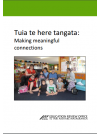In Term 3, 2014, ERO undertook a cluster review of five Puna Whakatupu as part of scheduled education reviews. During the course of these reviews, we identified a range of good practice that was investigated further and has become Tuia te here tangata: Making meaningful connections.
Purpose
ERO was interested in finding out and sharing the ways these Puna Whakatupu and their whānau nurture children on their paths to lifelong learning.
ERO’s 2012 report Partnership with Whānau Māori in Early Childhood Servicesidentified that Māori have a growing expectation of an education system that promotes culturally responsive partnership with whānau. In this report ERO set out to report on how Puna Whakatupu successfully work with whānau to improve participation in, and quality of, early childhood education for Māori children and their whānau.
Kaupapa Māori theory provides a platform from which Māori articulate their own reality, their own experience and their own personal truth. Inherent in this approach is an understanding that Māori have fundamentally different ways of seeing and thinking about the world and simply wish to be able to live in accordance with that specific and unique identity (p.4).
Mahuika (2008)
In Term 3, 2014 ERO undertook a cluster review of five Puna Whakatupu as part of scheduled education reviews. During the course of these reviews, we identified a range of good practice that was investigated further.
The stories in this report reflect effective practice documented in ERO’s 2015 reportInfants and toddlers: competent and confident communicators and explorers. In theInfants and toddlers report, relationships and interactions between teachers, children and their parents and whānau were strong, valued and prioritised. Culture and identity were respected and responded to through the curriculum and children were encouraged to explore and try new challenges. Like the puna stories in this report, embedded within their practice was the concept of whanaungatanga - the centrality of quality relationships and providing a whānau-like context that supports engagement and learning.

